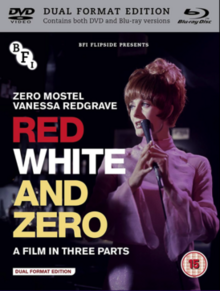| Red, White and Zero | |
|---|---|
 DVD cover | |
| Directed by | Peter Brook ( Ride of the Valkyrie ) Lindsay Anderson ( The White Bus ) Tony Richardson (Red and Blue) |
| Screenplay by | Peter Brook (Ride of the Valkyrie) Shelagh Delaney (The White Bus) Tony Richardson and Julian More (Red and Blue) |
| Produced by | Lindsay Anderson Oscar Lewenstein |
| Starring | Zero Mostel (Ride of the Valkyrie) Patricia Healey (The White Bus) Vanessa Redgrave (Red and Blue) |
| Cinematography | David Watkin (Ride of the Valkyrie) Miroslav Ondricek (The White Bus) Billy Williams (Red and Blue) |
| Edited by | Marlene Fletcher (Ride of the Valkyrie) Kevin Brownlow (The White Bus, Red and Blue) |
| Music by | Howard Blake (Ride of the Valkyrie) Misha Donat (The White Bus) Stanley Black and Monty Norman (Red and Blue) |
Production companies | Woodfall Film Productions Holly Productions |
| Distributed by | United Artists |
Release date |
|
Running time | 98 minutes (Ride of the Valkyrie – 14 minutes, The White Bus – 46 minutes, Red and Blue – 36 minutes) |
| Country | United Kingdom |
| Language | English |
Red, White and Zero is a 1967 British anthology film made by Woodfall Film Productions. It consists of three segments, directed by Peter Brook, Lindsay Anderson and Tony Richardson. [1]